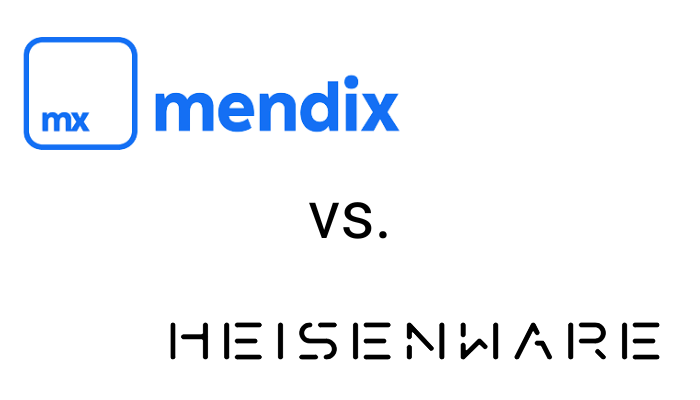Heisenware vs. Mendix: The pragmatic comparison
Compare the Low-Code/No-Code-Tools Heisenware and Mendix. Learn about their target groups, use cases, capabllities, features and much more.

Summary: Heisenware vs. Mendix
Heisenware is purpose-built for manufacturing — from shopfloor dashboards to IoT apps, asset management and complete industrial applications. It is designed for process engineers and "makers" who need to connect machines, visualize data, and automate workflows in a fraction of the usual time. It removes the need for complex IT infrastructure, offering native industrial connectivity (Siemens, OPC UA, MQTT) and a zero-maintenance environment. It is the best choice for companies that want fast, practical results in production without writing code.
Mendix is a general-purpose enterprise platform designed for large IT departments across all sectors. It excels at building complex, organization-wide software for sectors like Banking, Insurance, Retail, and more. It focuses on heavy governance, collaboration between professional developers and business units, and legacy system modernization. It is the right choice for massive, multi-departmental IT initiatives where development time and budget are less critical than architectural scope.
In short: Even though both are low-code platforms, Heisenware is for the shopfloor experts who want to build industrial applications instantly without IT dependency, while Mendix is for the CIOs who need to build large-scale, general-purpose enterprise architectures.
Detailed comparison of Heisenware and Mendix
Heisenware |
Mendix |
|
|
Target Group |
|
|
|
Key Use Cases |
|
|
|
Key Capabilities |
|
|
|
Key Differentiators |
|
|
|
Integrations & Connectors |
|
|
|
Setup & Onboarding |
|
|
|
Hosting Options |
|
|
|
Support & Community |
|
|
|
Business Model |
|
|
Questions and answers about how Heisenware is comparing with Mendix
How do Heisenware and Mendix compare in terms of ease of use?
Heisenware is designed for speed and simplicity, featuring a "Visual Development" environment with a "drag-and-drop app builder". It allows users to operate applications as "zero-maintenance configurations" with "no code to maintain".
Mendix is more complex, offering "Dual IDEs" (a web-based Studio and a desktop-based Studio Pro) and requires "lifecycle management, version control, and DevOps practices" to manage the software lifecycle.
Can non-IT professionals also build apps with Heisenware and Mendix?
Heisenware explicitly targets non-IT experts, specifically "Process engineers, OT experts, manufacturing managers, and 'citizen developers'" who understand the process "but do not write code".
Mendix targets a mix but leans toward IT professionals, including "CIOs, Software Engineering Leaders," and "Professional Developers." While it supports collaboration, full enterprise capabilities require professional developers and the desktop IDE.
Can both Heisenware and Mendix process real-time machine data and dashboards?
Yes, but differently.
Heisenware provides "Instant Integration" with "native connectors" for "Live machine data acquisition" (via OPC UA, Siemens S7, MQTT) and built-in "Real-time production & shopfloor dashboards".
Mendix handles this through integration with the "Siemens Ecosystem" (specifically Siemens Industrial Edge) and connectors available via its marketplace.
Which platform, Heisenware or Mendix, supports offline or edge computing better?
Heisenware offers a "Local Connection" via a secure "on-premise Agent" and allows users to "Self-host" on a standard Industrial PC (IPC) for "complete data sovereignty".
Mendix supports on-premise deployment but notes that it requires "additional configuration," often relying on the Siemens Industrial Edge for industrial contexts.
Are cloud hosting, storage, and support included in Heisenware and Mendix?
Heisenware: Cloud hosting is included. The Starter and Professional plans explicitly include "EU cloud hosting".
Mendix: Hosting costs are often separate.
In which situations should I choose Heisenware or Mendix?
Choose Heisenware if you are a manufacturer or machine builder (OEM) wanting to build shopfloor apps, asset tracking, or dashboards quickly using existing process experts without relying on internal IT or external developers.
Choose Mendix if you are a Medium to Large Enterprise aiming for digital transformation across multiple sectors (HR, Finance, Logistics) or legacy system modernization that requires heavy governance, code integration, and agile collaboration between IT and business teams.